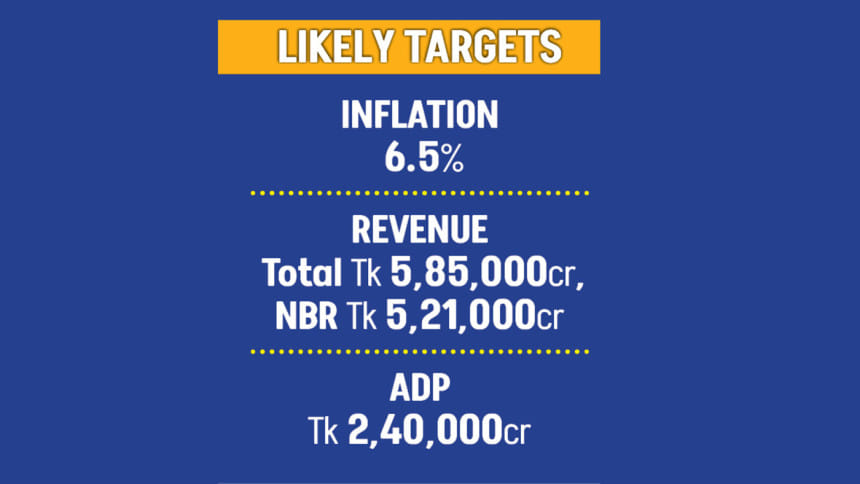Next budget aims for 6% GDP growth

The interim government aims to balance macroeconomic stability, inflation control, and 6 percent GDP growth in the next fiscal year's budget, when the 13th parliamentary election is expected.
The 2025-26 budget is likely to be around Tk 8,00,000 crore -- more or less the same as the original budget for the current year and about 7.5 percent higher than the revised budget, finance ministry officials told The Daily Star.
The development budget will likely be in the neighbourhood of Tk 2,30,000 crore to Tk 2,40,000 crore, up slightly from this fiscal year's revised allocation of Tk 2,16,000 crore.
The budget numbers will be discussed at the fiscal coordination council meeting scheduled for April 9. However, the final numbers will be locked in after consultations with the International Monetary Fund mission, which will be in Dhaka for two weeks starting April 6.
As part of the $4.5 billion loan programme, the IMF is insisting on high revenue mobilisation and other measures to address Bangladesh's persistently low tax-to-GDP ratio.
The tax reforms to be adopted are likely to be agreed upon during the IMF mission's visit.
For now, the finance ministry is considering a revenue target of Tk 5,85,000 crore -- up about 13 percent from the revised budget -- which would leave a budget deficit of Tk 2,15,000 crore.
Of the revenue target, the National Board of Revenue is likely to be tasked with collecting Tk 5,21,000 crore, up 12.4 percent from this fiscal year's revised target.
This will be enough to achieve the GDP growth target and rein in inflation within a 6.5 percent mark, according to ministry estimates. Inflation averaged 10.56 percent in the first eight months of the fiscal year.
"A 6 percent GDP growth is very high in any condition and in comparison to global economic growth or the South Asian growth average," said Zahid Hussain, a former lead economist of the World Bank's Dhaka office.
Earlier in December last year, the IMF projected Bangladesh's real GDP growth to slow to 3.8 percent this fiscal year but rebound to 6.7 percent next fiscal year.
For 6 percent growth to materialise, both investment and exports must increase significantly, Hussain said.
Letters of credit (LC) opening data for capital machinery imports indicate investment trends. This indicator dropped 30.1 percent year-on-year in the first eight months of fiscal 2024-25, while LC settlements were down 25.2 percent, according to the Bangladesh Bank.
Exports increased 10.5 percent year-on-year in the July-February period of this fiscal year to $32.9 billion, according to the Export Promotion Bureau.
"Political uncertainty is the main reason behind sluggish investment. It is highly unlikely that investment will see a turnaround soon, so to assume that would be impractical," Hussain said.
The surge in remittances since the political changeover on August 5 last year is unlikely to compensate for the private sector's declining appetite for investment.
Remittance inflow increased by nearly 28.5 percent to $21.43 billion in the July to March 26 period of the current fiscal year, compared to the same period in the previous fiscal year, according to Bangladesh Bank data.
"Remittance makes an indirect contribution to GDP," said Hussain, who was part of the 12-member committee that prepared a white paper on the state of the Bangladesh economy.
The IMF projects inflation to decline to 5 percent next fiscal year.
However, the 6.5 percent inflation target is achievable if the budget deficit remains below Tk 2,20,000 crore next fiscal year, according to Hussain.
Prof Selim Raihan, executive director of the South Asian Network on Economic Modelling, rued the "missed opportunity to prepare a realistic budget".
The budget should be drafted on realistic figures. Since this is not a political government, there was no need to impress with numbers."
The size of the budget is not too important in the Bangladesh context, said Raihan, also a teacher at the University of Dhaka's economics department.
"We lack the capacity to fully implement the budget, so the government should have focused more on improving execution."
However, the 6 percent growth that the government is hoping to achieve is "unrealistic", he said.
"The economy has significantly decelerated."

 For all latest news, follow The Daily Star's Google News channel.
For all latest news, follow The Daily Star's Google News channel. 



Comments